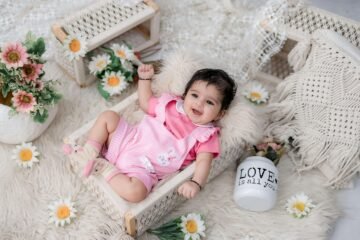
How to Wash Newborn Clothes: A Complete Guide
Congratulations, new parent! You’re likely accumulating a beautiful collection of newborn clothes, from tiny bodysuits to adorable sleepers. But before your little one wears them, there’s a crucial step: washing baby clothes. Their delicate skin is highly sensitive, making proper laundry practices essential. This complete guide will walk you through everything you need to know about washing newborn clothes safely and effectively.
Why Wash Newborn Clothes Before Wearing?
There are several important reasons to wash all new baby clothes, blankets, and even cloth diapers before your baby uses them:
- Remove Irritants: New clothes can contain chemicals, dyes, and finishes from the manufacturing process that can irritate a baby’s sensitive skin, potentially leading to rashes or allergic reactions.
- Cleanliness: Items may have been handled by many people in stores or factories, accumulating dust, dirt, or germs.
- Softness: Washing new garments can make them softer and more comfortable for your baby.

Choosing the Right Laundry Detergent for Baby Clothes
This is perhaps the most critical decision when it comes to washing baby clothes. Opt for detergents that are gentle and free from harsh chemicals.
- Hypoallergenic: Look for detergents labeled “hypoallergenic,” “free and clear,” or “fragrance-free.” These are formulated to minimize the risk of allergic reactions.
- Dye-Free: Dyes can be harsh irritants for baby’s skin.
- Fragrance-Free: Artificial fragrances are a common cause of skin irritation and may contain phthalates.
- Enzyme-Free (Optional): Some parents prefer enzyme-free detergents, as enzymes can sometimes be irritants, though they are very effective at breaking down stains.
- Consider “Baby” Detergents: While often marketing ploys, some specific “baby” detergents are genuinely formulated with fewer irritants. However, a good “free and clear” adult detergent will often suffice.
Sorting and Preparing Baby Clothes for Washing

Just like adult laundry, sorting baby clothes properly helps protect them and ensure they get clean.
- Separate by Color: Wash whites and light colors separately from darks to prevent color bleeding.
- Separate by Fabric Type (Optional but Recommended): While not always necessary, separating very delicate items (like cashmere or wool blends) or heavily soiled items can be beneficial.
- Check Labels: Always read the care labels on baby garments for specific washing instructions. Some delicate items may require hand washing or air drying.
- Pre-Treat Stains: Treat any tough stains (like spit-up, diaper blowouts, or food stains) before washing.
- Fasten Zippers and Snaps: Close zippers and fasten snaps to prevent them from snagging other clothes in the wash.
- Turn Inside Out: For heavily decorated or printed items, turning them inside out can help protect the design.
Washing Temperatures and Cycles
- Warm or Hot Water: For heavily soiled items, warm or hot water (if the fabric allows) can be more effective at killing germs and removing stains. However, cold water works well for most everyday washes and is more energy-efficient.
- Delicate Cycle: For most baby clothes, a delicate or gentle cycle is recommended to preserve the fabric’s integrity and softness.
- Extra Rinse Cycle: If your washing machine has an “extra rinse” option, use it. This helps ensure all detergent residue is thoroughly rinsed out, which is crucial for sensitive skin.
Drying Baby Clothes
- Tumble Dry Low: The safest option for most baby clothes in a dryer. High heat can shrink clothes and damage delicate fabrics.
- Air Dry/Line Dry: Whenever possible, air drying is an excellent option. It’s gentle on clothes, energy-efficient, and natural sunlight can even help bleach out stains.
- Avoid Dryer Sheets and Fabric Softeners: These often contain fragrances and chemicals that can irritate a baby’s skin and may reduce the flame resistance of sleepwear.
Special Considerations for Baby Laundry

- Newborn Sleepwear: Baby sleepwear is often treated with flame-retardant chemicals for safety. Avoid using fabric softeners, as they can break down these chemicals. Always check the garment’s label.
- Cloth Diapers: If you’re using cloth diapers, they have a specific washing routine that typically involves a cold rinse, a hot wash with a baby-safe detergent, and then another rinse. Research “cloth diaper wash routine” for detailed instructions.
- New Clothes vs. Hand-Me-Downs: Always wash both new clothes and hand-me-downs. Hand-me-downs may have been stored for a long time and could have accumulated dust or allergens.
- First Few Months: Be extra vigilant with laundry practices during your baby’s first few months, as their skin is most sensitive during this period. You can eventually transition to your regular family detergent if your baby shows no signs of irritation.
Washing newborn clothes doesn’t have to be daunting. By choosing the right detergent, sorting properly, and using gentle washing and drying methods, you’ll keep your baby’s wardrobe clean, soft, and safe for their precious skin. Happy laundry day!



